As expected, they came, they talked, they condemned, they had nice coffee, they had a photo op, and they went home without any meaningful solution in the Palestinian crisis, which saw the destruction of Gaza Strip thanks to Hamas terrorism on Oct 7 that butchered 1,200 Israelis, which in turn triggered Israel’s fierce military retaliations – killing more than 11,000 Gazan so far, and counting.
Even before the Arab and Muslim leaders met on Saturday (11 November), a split was already visible. The Arab League and the Organisation of Islamic Cooperation (OIC), a 57-member bloc that includes Iran, were originally meant to meet separately. Eventually, they decided to merge the meetings after Arab League delegations failed to reach an agreement on a final statement.
Some Muslim nations, including Algeria and Lebanon, proposed cutting oil supplies to Israel like the 1973 oil embargo as well as severing the economic and diplomatic ties that some Arab League nations have with Israel. However, at least three countries – including the United Arab Emirates (UAE) and Bahrain, which normalised ties with Israel in 2020 – rejected the proposal.
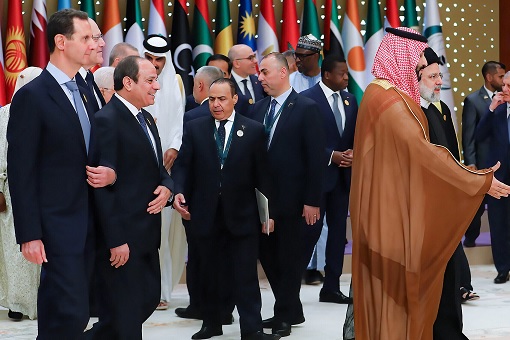
In 1973, the Arab-Israel conflict continued when Egypt tried to take back the occupied land of the Sinai Peninsula, starting the Yom Kippur War. The “Fourth Arab-Israeli War” triggered the “1973 Oil Crisis” when Saudi King Faisal led the Organization of Arab Petroleum Exporting Countries (OAPEC) to slap an oil embargo on Western countries, including the U.S., for providing military aid to Israel.
The embargo, designed to punish the U.S., saw the world price of oil nearly quadrupled from US$2.90 a barrel to US$11.65 a barrel in January 1974. In March 1974, amid disagreements within OAPEC on how long to continue the punishment, the embargo was officially lifted. The embargo, however, caused an oil crisis – or “shock” – with many short-term and long-term effects on global politics and the global economy.
Of course, after the 1973 Oil Crisis, the U.S. made an offer Saudi could not refuse – military protection for Saudi’s oil fields. It also agreed to provide the Saudis with weapons, and crucially – guaranteed protection from Israel. In return, the kingdom must agree to price all their oil sales in U.S. dollar only. Also, the Saudis would be open to investing their surplus oil proceeds in U.S. debt securities.
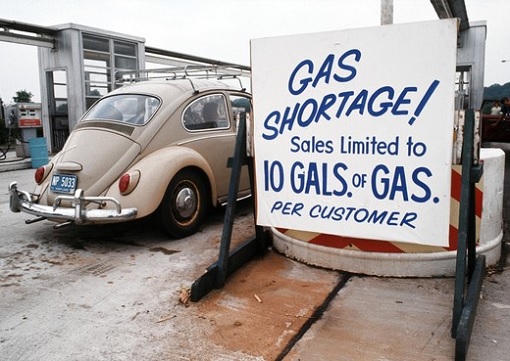
However, the same trick won’t work again largely because unlike in the 1970s, the U.S. has been the world’s biggest oil producer since 2018. Therefore, it could easily supply energy to Israel, not that the country relies on the Middle East for oil and gas because the Arabs do not have diplomatic and commercial relations with Israel in the first place. The Israeli gets its oil from Kazakhstan, Azerbaijan, Nigeria and Brazil.
Additionally, having learned its lesson, Western oil companies have pivoted to the offshore Gulf of Mexico and North Sea, and the Arctic regions of northern Alaska. OPEC’s dominance of world oil supply has also diminished. OPEC’s 13 members account for just 36% of global oil production today, down from 53% prior to the 1973 embargo. Hence, an oil embargo on Israel would be more symbolic rather than damaging.
It was indeed hilarious when Iran – the world’s biggest terrorist sponsor – had not only proposed sanctions and an energy boycott against Israel, but wanted Islamic countries to designate the Israel as a “terrorist organization”. Besides sponsoring Hamas and Lebanon’s Hezbollah terror groups, the Iranian government, like the Algerian government, does not sell any oil and gas to the Jews.
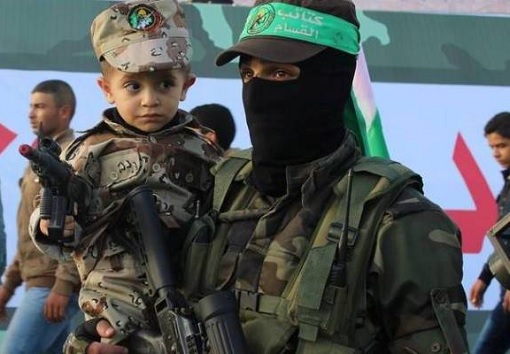
Iranian President Ebrahim Raisi, mirroring Hamas’ refusal to recognize Israel and the existence of the Jewish state (hence the failure to the “two-state” solution), told the emergency summit held in Riyadh that the only solution to the conflict is a Palestinian state from the “river to the sea” – meaning a total elimination or destruction of the State of Israel, which was already a non-starter.
In fact, in praising the Palestinian Hamas terror group for butchering 1,200 Israelis and taking about 240 people hostage, the Iranian president said – “There is no other way but to resist Israel. We kiss the hands of Hamas for its resistance against Israel”. By openly endorsing Hamas, Iran was trying to lure rival Saudi Arabia to legitimise the terror group.
In response, Benjamin Netanyahu urged Arab leadership to “stand up against Hamas”. Reminding the Sunni-Muslims of the hidden hand behind the crisis, the Israeli prime minister said – “It only brought two things to the Gaza Strip – poverty and blood. Hamas is an integral part of the terror axis that Iran leads and that axis of terror and hatred endangers the whole world and the whole Arab world.”
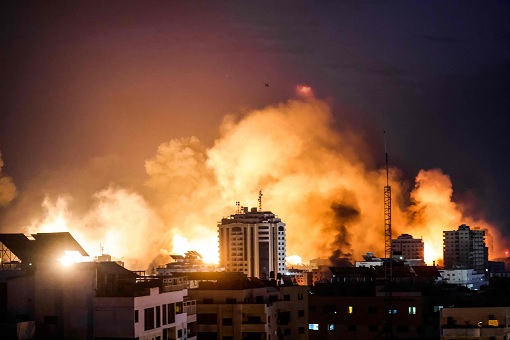
Clearly, Iran and its allies have nothing to lose with the proposal to sanctioning oil, severing economic and freezing diplomatic ties with Israel. Additionally, there were also proposals to disallow flights to and from Israel using Arab countries’ air space, as well as to form a joint mission to put pressure on Western nations for a ceasefire. But that was not the end of the rhetoric.
The biggest factor splitting the Iran-led Shia Muslims and Saudi-led Sunni Muslims was the suggestion that the United States – the biggest protector of Saudi and its allies in the region – is prohibited from using its military bases in Arab countries to supply Israel with weapons. In truth, the Arabs don’t have access, let alone telling Washington what it can or cannot do with its weapons arsenal.
Expectedly, Saudi Arabia along with the United Arab Emirates (UAE), Egypt, Jordan, Bahrain, Sudan, Morocco, Mauritania and Djibouti voted against harsher resolutions to punish Israel for obvious reasons. Saudi Crown Prince Mohammed bin Salman, the Gulf kingdom’s de-facto ruler, was smart enough to smell Iranian’s agenda in putting the Arab League and U.S.-Israel at loggerheads.
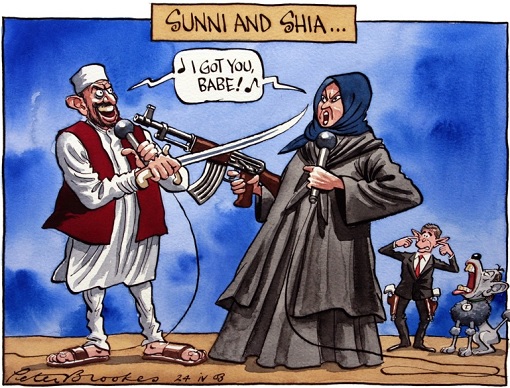
The emergency meeting is not merely about Palestinians. Like it or not, it’s still about the thousand-year-old rivalry and political balance between Sunni and Shia Muslims, a split between the two main sects within Islam that goes back some 1,400 years. Despite Chinese-brokered peace deal, the distrust and suspicion between Saudi and Iran cannot be erased overnight.
Despite the Arab League’s 3-million active military personnel and US$180 billion military expenditure, which is 10 times more than Israel’s US$18 billion, Saudi and its allies were not interested to fight Israel, let alone to defend the Palestinians militarily. In fact, Saudi does not give a damn about the Gaza Strip as long as Israel fights the Shia-Muslims led by Iran, along with proxies like Hamas.
Israel maintains full diplomatic relations with Egypt, Jordan, Bahrain and the UAE. Kuwait said in 2015 that Israel is NOT our enemy, followed by Saudi Crown Prince Mohammed bin Salman’s move to become a friend of Israel – admitting that the Jews have the right to have their own country. Israel Prime Minister Benjamin Netanyahu had also made a historic visit to Oman.
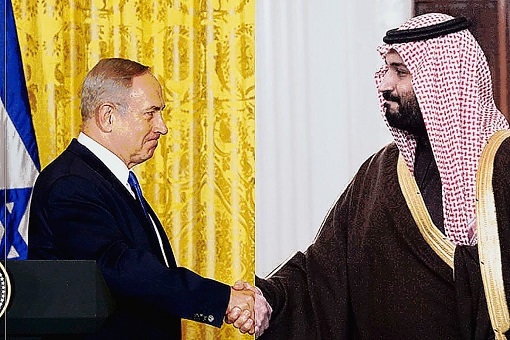
And Saudi Arabia was ready to normalise relations with Israel in exchange for a US defence pact and civilian nuclear programme. Part of the reasons Hamas terrorized Israel was to sabotage the historic normalizing ties between Israel and the Arab states. It had nothing to do with the welfare of the Palestinians. Hamas, being sponsored by Iranian Mullahs, is just using Palestinians as its human shields and pawn.
As far as Saudi and allies are concerned, Hamas is just another terrorist group, the same way the Arab League declared the Lebanese Shia Muslim movement Hezbollah a terrorist organization in 2016. Hamas is a spin-off of the Palestinian branch of the Muslim Brotherhood, which gave birth to the Arab Spring uprisings – threatening Saudi, UAE, Kuwait, Bahrain, Qatar and Oman monarchies.
The consolation prize from the Nov 11 Arab summit – a rejection of Israeli assertions that it is acting in self-defense and demanded that the United Nations Security Council adopt “a decisive and binding resolution” to halt Israel’s “aggression.” In other words, the toothless Arab League is passing the buck to another world agency to solve the decade-old issue.
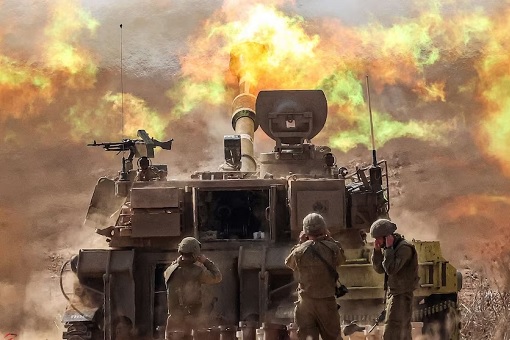
Saudi Arabia and other Muslim countries also called for an immediate end to military operations in Gaza. However, Israel has already said there will be no ceasefire until all the hostages are released. Hamas, on the other hand, said it needed a ceasefire to negotiate for the release of hostages. Israel considers a ceasefire as tantamount to surrender to terrorism and barbarism.
Another resolution by the 57-Muslim nations included a call for the International Criminal Court to prosecute Israel for committing war crimes. This is yet another non-starter simply because the ICC has no jurisdiction given that Israel is not a party to the statute of Rome and Palestine is not a sovereign state. In fact, major powers like the U.S., China, Russia, India and even Egypt are not members of the ICC.
Even if the ICC were to issue warrants in the Israeli-Palestinian conflict, the court has no police force and would rely on member states to make arrests, not to mention Israel doesn’t recognise the court. Likewise, strong statements from several Arab leaders condemning the U.S. and western world’s “double standards” on Israel’s actions in Gaza were merely empty rhetoric.
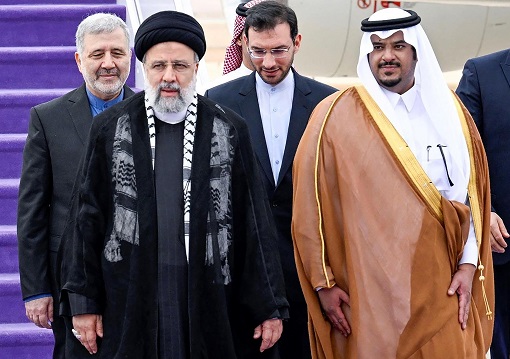
Other Articles That May Interest You …
- Human Shields – How Hamas Cleverly Wins Propaganda War, But Was Stunned By “Fire Power” Unleashed By Israel
- Told You So!! – Congrats To Anwar For Radicalizing School Kids As Potential Hamas Terrorists Playing With Guns
- An Eye For An Eye!!! – No One Can Stop Israel From Reducing Gaza To Rubble And Erase Hamas Terrorists
- Israel At War – How Biden Funded Terrorist Hamas With $6 Billion, And Why Hamas’ Invasion Was A Dumb Move
- Careful What You Wish For – Malaysia Could Face U.S. Economic Sanctions For Funding Taliban Terrorists
- Scoring Political Brownie Points – After Hishammuddin, Now Silly PAS Leaders Want To Send Troops To Palestine
- Israel-UAE Full Diplomatic Deal – The First Step Towards Recognition Of Israel By More Gulf Arab States
- Iran’s Trouble Has Just Begun – Why It Finally Admits “Unintentionally” Shot Down Civilian Ukrainian Plane
- What The Arabs Don’t Want You To Know – How Israel Secretly Saved Egypt From ISIS
- The Lifestyle Of “Rich Kids Of Tehran” Fuels The Fire Of Protest In Iran (Photos)
- Malaysia Declares War On “Impenetrable” Israel … To Be Slaughtered Like A Pig?

|
|
November 13th, 2023 by financetwitter
|


|

|

|

|

|

|




























Israel has been practising state terrorism and carrying out genocidal ethnic cleansing ever since its creation by Britain.
Not much point earning any shilling or shekels singling out Hamas which isn’t really seen as a “terrorist” organisation by the majority of countries in the world. A “terrorist” to one side may be seen as a “freedom fighter” to another. Mandela was a “terrorist”, so were the freedom fighters of most of Africa, South America, Asia, the IRA, indeed most of the world.
On the one hand the Arab world can be condemned for being practically useless over their fate and politics and not doing anything to help their lot (many Arab countries are propped up by the US), on the other hand when those like Hamas take up arms, they are condemned by the usual suspect (shills for US money) for being “terrorists”.
Talk about double standards…
Today’s “terrorists” invariably become tomorrow’s “freedom fighter”, the fight for US independence were carried out by “terrorists” against Britain, btw. The “bad news” here is Old Chin Peng, Rashid Mydin, Abdullah CD, etc may jolly well become tomorrow’s “freedom fighters”, no reason why not!